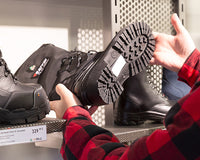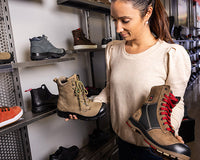In Canada, many companies require their employees to wear safety shoes that meet the CSA green triangle standard (CAN/CSA-Z195-02). This standard means that the shoes have a midsole to protect the bottom of your foot and a protective toe cap to protect your toes. The CSA standard is very important to prevent accidents in the workplace.
The different types of toe caps
The role of a toe cap is to absorb the shock that could be received by the tip of your foot. They can be made of different materials:
Steel: The steel toe cap is the most popular on the market and is an old and proven technology. Many workers have used this type of toe cap their entire career and are very satisfied with it.
Composite: The composite toe cap is the newest product on the market and is just as effective as steel in protecting the foot. A composite material is obtained by assembling at least 2 materials with distinct physical and chemical properties and a strong adhesive capacity. Plastic, Kevlar and fiberglass (or carbon) are popular materials for making composite toe caps. This material is lightweight, non-conductive to cold or heat and non-metallic.
Aluminum: The use of aluminum is also very recent. It is still not widely used and is mostly found in indoor shoes. The aluminum toe cap is lighter than the steel toe cap and offers a more delicate shoe design without affecting the fit. It is mainly used to reduce the weight of the shoe. Aluminum is not metal-free so the toe cap cannot be used for non-metallic type shoes.
Carbon: Not to be confused with carbon nanofiber, carbon toe caps are composite toe caps where the majority of the material is strong and durable carbon fiber. Exceptionally strong, it is also very light. Products using it are more expensive and rarer.
Nano carbon: The nano carbon tip is the cream of the composite. It is 40% lighter. Obtained by assembling one or more specific types of hyper-hard substances made of carbon using nanotechnology (these are the nano-tips or carbon tips). The extreme lightness and the very reduced thickness are the main characteristics of this avant-garde product. The products using it are more expensive and rarer.

The characteristics of each
Regardless of the material, a toe cap that is CSA certified will be able to protect your foot from impact. However, some materials will have advantages that make them a designated choice for your everyday needs. That's why it's important to evaluate which toe cap would be best for you.
Steel: As mentioned earlier, the steel toe cap is the most popular among workers. This material has been used for a long time in the making of work boots. It is the most economical to use, so a shoe with a steel toe will cost less than other types.
However, the saving in price also comes with some disadvantages. Steel is the heaviest material. The shoe will therefore be a little more tiring to wear, especially when you have to wear it all day. Also, steel conducts cold, which is not very practical in winter.
Composite: Composite is lighter than steel, so it reduces the weight of your shoes as well as the fatigue. Composite is not a cold conductor, making it ideal for winter or all-season boots.
These benefits come with a higher price tag, however. Belmont offers composite toe and sole boots for every budget.
Aluminum: Aluminum is lighter than steel and composite. However, like steel, it will conduct cold. That's why we see aluminum more in indoor shoes. It is a material that is not yet widely used in safety shoes. Aluminum is also more expensive than steel and it does not allow for a "metal-free" shoe for jobs that require it.

What to choose?
What type of toe box should you choose? That's a good question and it depends on a lot of factors. Here are a few things to keep in mind:
- If you need a shoe in a cold weather setting, choose the composite toe cap.
- If you use your shoes every day and want more comfort, choose the composite toe cap.
- If you need a metal-free shoe, choose the composite toe cap.
- If you only use your shoes in the summer or indoors and weight is not an issue, choose the steel toe.
- If you rarely use your shoes, choose steel.
If you have any questions, our consultants will be happy to answer them!
Visit one of our 5 stores or write to our customer service at info@belmont-inc.com.




